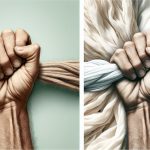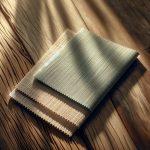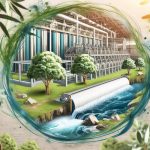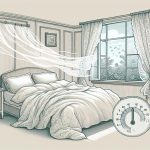Are you passionate about sustainable fashion?
Discover six organic fabrics that are revolutionizing the industry.
From versatile hemp to luxurious bamboo, these eco-friendly materials offer style without compromising the planet.
Experience the softness of organic cotton and the timeless elegance of linen, both produced with a conscience.
Embrace the future with Tencel, a next-generation fabric that prioritizes sustainability.
For the vegan fashionistas, soy silk provides a cruelty-free alternative.
And don’t forget recycled polyester, giving new life to old materials.
Join the movement and dress sustainably!
Table of Contents
Hemp: The Versatile Sustainable Fabric
Hemp is a versatile and sustainable fabric that offers numerous benefits in the world of fashion. Its versatility lies in its ability to be used for various types of clothing and accessories. From shirts and pants to bags and shoes, hemp can be woven into different textures and weights to suit different fashion needs. The versatility of hemp also extends to its ability to blend well with other fibers, such as cotton or silk, to create unique and desirable fabrics.
One of the key advantages of hemp is its sustainability. As a plant, hemp requires less water and fewer pesticides compared to other crops used in fabric production. It’s also a fast-growing plant that can be harvested multiple times in a year, making it a highly renewable resource. Additionally, hemp plants have deep roots that help prevent soil erosion and improve soil quality, making it an environmentally friendly choice.
In a world where sustainability is becoming increasingly important, hemp is emerging as a sustainable alternative to conventional fabrics. Its versatility, combined with its eco-friendly properties, makes it an attractive option for designers and consumers alike. By choosing hemp, you can contribute to a more sustainable fashion industry without compromising on style and quality.
Bamboo: Luxurious and Eco-Friendly
Bamboo is a sustainable textile powerhouse, offering a range of benefits for both the environment and fashion industry.
Not only does it provide luxurious comfort, but it also boasts eco-friendly advantages.
With its rapid growth, low water usage, and natural pest resistance, bamboo is a promising fabric choice for those seeking sustainable fashion options.
Bamboo: Sustainable Textile Powerhouse
When it comes to sustainable fashion, you’ll be amazed by the luxurious and eco-friendly qualities of bamboo, a textile powerhouse. Bamboo isn’t only versatile and durable, but it also offers a range of benefits that make it a popular choice in the fashion industry:
- Bamboo fabric is incredibly soft and smooth, providing a luxurious feel against your skin.
- It has natural moisture-wicking properties, keeping you cool and dry even in hot weather.
- Bamboo is naturally hypoallergenic, making it a great option for those with sensitive skin.
- The fabric is also highly breathable, allowing air to circulate and reducing the risk of odors.
With its versatility and durability, bamboo is revolutionizing sustainable fashion by providing a renewable and eco-friendly alternative to traditional textiles.
Luxurious Comfort of Bamboo
Indulge in the luxurious comfort of bamboo fabric, which offers an eco-friendly and opulent experience for you. Bamboo fabric is known for its softness and breathability, making it a perfect choice for comfortable clothing options.
Bamboo fabric properties include its natural moisture-wicking abilities, which keep you cool and dry even in the hottest weather. It is also hypoallergenic and gentle on sensitive skin, making it suitable for those with allergies or skin sensitivities. The fabric is naturally antibacterial, preventing the growth of odor-causing bacteria, so you can stay fresh all day long.
In addition to its incredible comfort, bamboo fabric is also sustainable. Bamboo is a renewable resource that grows quickly and requires minimal water and pesticides. Choosing bamboo clothing options allows you to enjoy luxurious comfort while making an environmentally conscious choice.
The table below highlights some popular bamboo clothing options:
| Clothing Item | Description | Benefits |
|---|---|---|
| Bamboo T-shirts | Soft and lightweight shirts made from bamboo fabric. | Breathable, moisture-wicking, hypoallergenic. |
| Bamboo Leggings | Stretchy and comfortable leggings made with bamboo fabric. | Soft, breathable, and flexible. |
| Bamboo Socks | Soft and moisture-wicking socks made from bamboo fabric. | Antibacterial, odor-resistant, and eco-friendly. |
| Bamboo Robes | Luxurious robes made with bamboo fabric for ultimate comfort. | Silky smooth, lightweight, and absorbent. |
| Bamboo Underwear | Comfortable underwear made from bamboo fabric. | Breathable, moisture-wicking, and hypoallergenic. |
Eco-Friendly Benefits of Bamboo
Continue to embrace the eco-friendly benefits of bamboo fabric as you explore its luxurious and sustainable qualities. Bamboo textile offers numerous benefits that make it a popular choice for environmentally conscious individuals:
-
Sustainability: Bamboo is a highly sustainable plant, as it grows rapidly and requires minimal water and pesticides. Choosing bamboo fabric helps to reduce the environmental impact of clothing production.
-
Softness: Bamboo fabric is incredibly soft and gentle on the skin, providing a luxurious feel that rivals traditional materials like silk or cashmere.
-
Breathability: Bamboo fabric is naturally breathable, allowing air to circulate and keeping you cool and comfortable throughout the day.
-
Hypoallergenic: Bamboo fabric is hypoallergenic and suitable for those with sensitive skin or allergies. It’s free from harsh chemicals and irritants, making it a safe and comfortable option.
Organic Cotton: Softness With a Conscience
Organic cotton offers a range of environmental benefits, making it a popular choice for sustainable fashion. By avoiding the use of harmful pesticides and chemicals, organic cotton production reduces water pollution and soil erosion.
Additionally, ethical considerations in cotton production, such as fair labor practices and safe working conditions, contribute to the appeal of this eco-friendly fabric.
With a growing demand for organic cotton, fashion brands are increasingly turning to this soft and sustainable option.
Environmental Benefits of Organic Cotton
Experience the environmental benefits of choosing organic cotton for your sustainable fashion choices. When you opt for organic cotton, you aren’t only making a fashion statement but also contributing to the preservation of our planet.
Here are some reasons why organic cotton is an eco-friendly choice:
-
Ethical sourcing: Organic cotton is grown without the use of harmful chemicals and pesticides, ensuring the well-being of farmers and surrounding communities.
-
Water conservation: Organic cotton requires significantly less water compared to conventional cotton. By choosing organic cotton, you’re helping to conserve this precious resource.
-
Reduced soil erosion: Organic cotton farming practices promote healthy soil, preventing erosion and degradation, which is crucial for the long-term sustainability of our agricultural lands.
-
Biodiversity preservation: Organic cotton farming supports a diverse ecosystem by avoiding the use of harmful chemicals that can harm wildlife and pollinators.
Make a positive impact on the environment and embrace the softness of organic cotton in your sustainable fashion choices.
Ethical Considerations in Cotton Production
When choosing organic cotton for your sustainable fashion choices, you can actively contribute to ethical considerations in cotton production. Organic cotton is produced using fair trade practices, ensuring that farmers are paid fair wages and work in safe conditions. By supporting fair trade practices, you’re helping to create a more equitable and sustainable cotton industry.
Additionally, organic cotton production uses significantly less water compared to conventional cotton. This is because organic cotton is grown without the use of synthetic fertilizers and pesticides, which reduces water pollution and conserves water resources. By choosing organic cotton, you’re making a conscious choice to support a more ethical and sustainable fashion industry, while also minimizing the environmental impact of water usage in cotton production.
Growing Demand for Organic Cotton
By supporting fair trade practices, you contribute to the growing demand for organic cotton and its softness with a conscience. As consumers become more aware of the environmental impact of traditional cotton farming, the demand for organic cotton is on the rise. Here’s why this shift is important:
-
Organic cotton farming promotes sustainability by reducing the use of harmful pesticides and chemicals, protecting both the environment and the farmers.
-
Choosing organic cotton supports fair trade practices, ensuring that farmers receive fair wages and safe working conditions.
-
Organic cotton is hypoallergenic and gentle on the skin, making it a comfortable and healthy choice for clothing.
-
By opting for organic cotton, you’re taking a step towards a more sustainable and ethical fashion industry.
Join the movement and embrace the growing demand for organic cotton, making a positive impact on both the environment and the lives of cotton farmers.
Linen: Classic Style Meets Sustainability
Discover how linen, with its timeless appeal and eco-friendly properties, can effortlessly elevate your sustainable fashion game. When it comes to classic meets sustainability, linen takes the spotlight. This versatile fabric has been a staple in fashion for centuries, known for its durability, breathability, and natural beauty.
But what makes linen truly stand out is its sustainable nature.
Linen sustainability starts from the very beginning of its lifecycle. The flax plant, from which linen is derived, requires significantly less water and pesticides compared to other crops. This means that less water is wasted, and fewer chemicals are released into the environment. Additionally, flax is biodegradable, ensuring that linen clothing won’t contribute to the ever-growing problem of textile waste.
Not only is linen kind to the environment, but it also offers numerous benefits for the wearer. Its breathability keeps you cool in hot weather, while its moisture-wicking properties help absorb sweat, making it ideal for summer clothing. Linen’s natural texture adds a touch of elegance to any outfit, whether it’s a crisp button-down shirt or a flowing summer dress.
In conclusion, linen is a true champion of sustainable fashion. Its classic style and eco-friendly properties make it a must-have fabric for those who want to make a positive impact on the planet while looking effortlessly stylish.
Tencel: The Next Generation of Eco-Friendly Fabric
Are you ready to explore Tencel, the next generation of eco-friendly fabric that continues the conversation on sustainable fashion? Tencel fabric production involves a closed-loop process, where the solvent used to dissolve the wood pulp is recycled, making it more environmentally friendly compared to other fabrics.
Here are some reasons why Tencel stands out among other sustainable fabrics:
- Soft and smooth: Tencel has a luxurious feel against your skin, providing ultimate comfort and breathability.
- Moisture-wicking: Tencel has excellent moisture absorption, keeping you dry and fresh even on the hottest days.
- Biodegradable: Tencel is made from sustainably sourced wood pulp, and it naturally breaks down in the environment, reducing waste.
- Versatile: Tencel is a highly versatile fabric that can be used in various clothing items, from casual t-shirts to elegant dresses.
When compared to other sustainable fabrics, Tencel offers unique advantages. It has a lower environmental impact than cotton, as it requires less water and pesticides for cultivation. Additionally, Tencel has a lower carbon footprint compared to synthetic fabrics like polyester.
Soy Silk: A Vegan Alternative for Sustainable Fashion
Try incorporating soy silk into your sustainable fashion choices as a vegan alternative fabric. With the growing popularity of vegan fashion, it’s important to consider sustainable options that align with your values. Soy silk, also known as soybean fiber, is a plant-based fabric that offers a cruelty-free alternative to traditional silk. Made from the byproduct of soybean oil production, soy silk is both eco-friendly and sustainable.
Soy silk isn’t only vegan-friendly, but it also has several environmental benefits. The production process of soy silk requires less water and energy compared to traditional silk production. Additionally, soy silk is biodegradable, meaning it can break down naturally without harming the environment.
Incorporating soy silk into your wardrobe can contribute to the sustainability of the fashion industry. By choosing this vegan fabric, you’re supporting the use of plant-based materials and reducing the demand for animal-derived products. This shift towards vegan fashion promotes a more compassionate and sustainable approach to textiles.
As the demand for sustainable and vegan fashion continues to rise, soy silk offers a viable alternative for conscious consumers. By choosing soy silk, you can contribute to a more environmentally friendly and cruelty-free fashion industry. So why not give soy silk a try and make a positive impact in the world of sustainable fashion?
Recycled Polyester: Giving New Life to Old Materials
Consider incorporating recycled polyester into your sustainable fashion choices to give new life to old materials. Recycled polyester is a great way to upcycle textiles and reduce waste in fashion.
Here are four reasons why you should embrace this eco-friendly fabric:
-
Environmental Impact: By using recycled polyester, you’re diverting plastic waste from landfills and reducing the need for virgin polyester production. This helps to conserve resources and minimize the carbon footprint associated with textile manufacturing.
-
Versatility: Recycled polyester can be used to create a wide range of clothing items, from activewear to outerwear. It offers the same durability, flexibility, and breathability as virgin polyester, making it a great choice for sustainable fashion.
-
Quality and Performance: Despite being made from recycled materials, polyester retains its strength and resilience. It’s resistant to wrinkling and shrinking, ensuring longevity and durability in your clothing.
-
Fashion Forward: Recycled polyester isn’t only a sustainable choice but also a stylish one. With advancements in technology, designers are creating fashionable and trendy garments using this eco-friendly fabric.
Frequently Asked Questions
How Is Hemp Fabric Different From Other Sustainable Fabrics?
Hemp fabric is different from other sustainable fabrics because of its numerous advantages. It is durable, breathable, and requires less water and pesticides to grow. It can be used for clothing, accessories, and even home textiles.
Are There Any Drawbacks or Limitations to Using Bamboo Fabric in Sustainable Fashion?
There are indeed some drawbacks to using bamboo fabric in sustainable fashion. It requires a lot of water and energy to produce, and the chemicals used in processing can have a negative impact on the environment.
What Are the Benefits of Choosing Organic Cotton Over Conventional Cotton in Fashion Production?
Choosing organic cotton over conventional cotton in fashion production has numerous benefits. It is better for the environment, as it avoids harmful chemicals and reduces water consumption. Additionally, it promotes healthier working conditions for farmers and is softer on your skin.
How Does Linen Compare to Other Sustainable Fabrics in Terms of Durability and Longevity?
Linen and hemp are both sustainable and eco-friendly fabrics. When it comes to durability and longevity, linen is known for its strength and ability to withstand wear and tear, making it a great choice for sustainable fashion.
What Sets Tencel Apart From Other Eco-Friendly Fabrics in Terms of Its Production Process and Environmental Impact?
Tencel stands out among eco-friendly fabrics due to its unique production process and minimal environmental impact. Its innovative method involves using renewable wood sources and using a closed-loop system that recycles solvents.
- How Does Ring Spun Cotton Affect Garment Fit and Shape Retention? - August 13, 2024
- What Are the Challenges in Producing Ring Spun Cotton? - August 13, 2024
- Is Ring Spun Cotton Suitable for Plus-Size Clothing? - August 13, 2024






